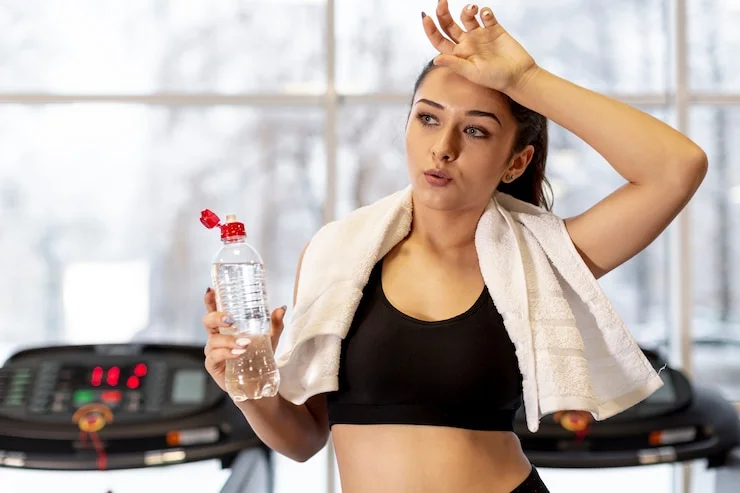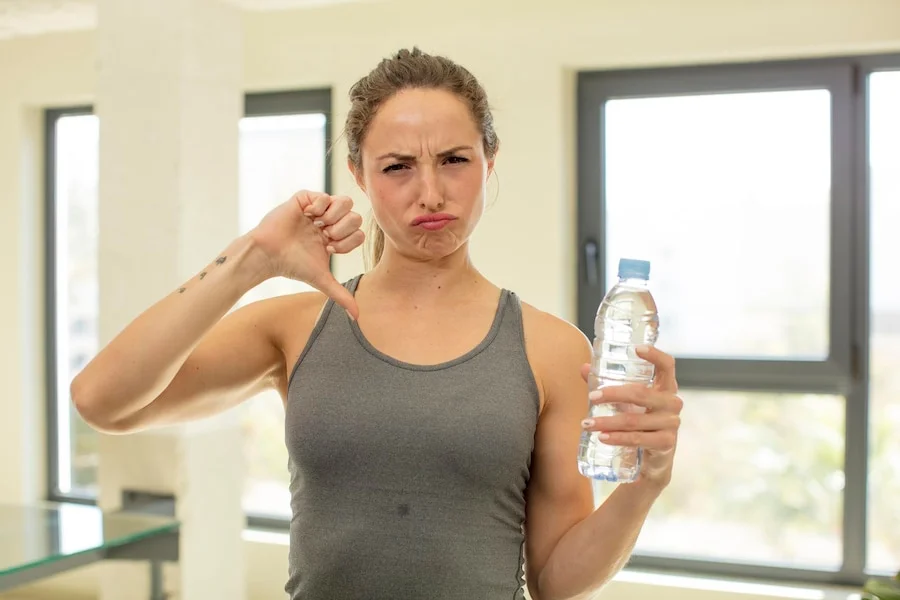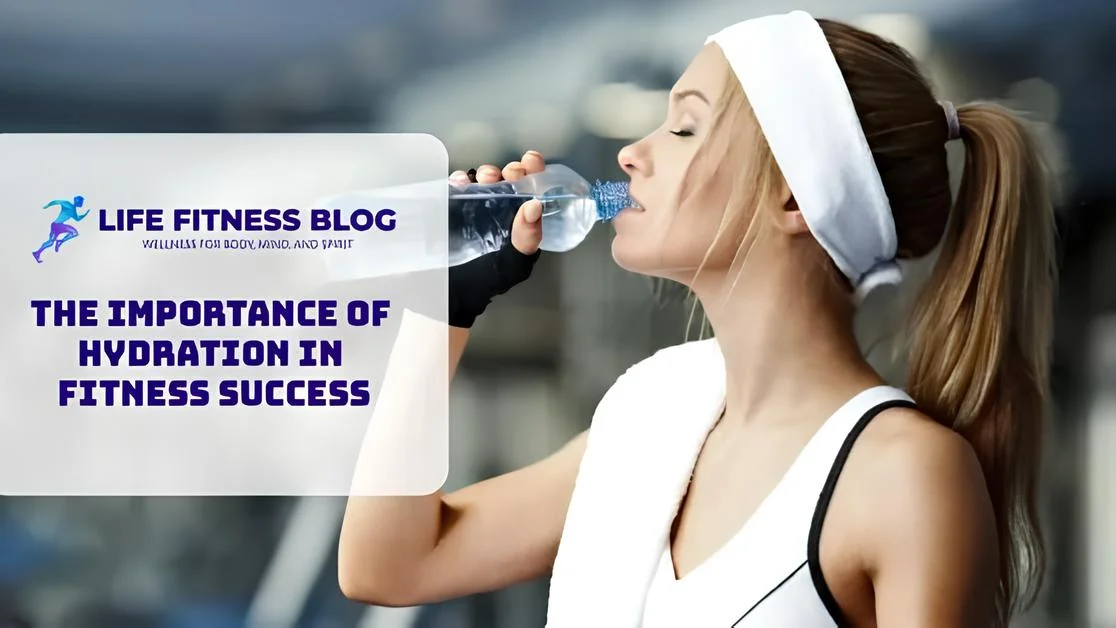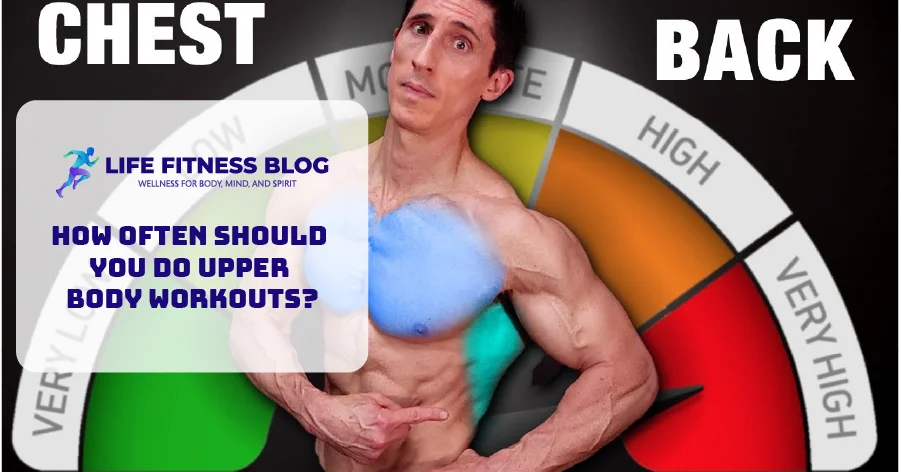Understanding the role of hydration in fitness is key to success. It affects your performance, recovery, and health. Water intake is vital for any fitness plan. This article will show how hydration impacts your body and how to stay hydrated for better performance.
Staying hydrated is crucial for your fitness journey. It boosts your performance, aids in recovery, and keeps you healthy. We’ll dive into the importance of hydration in fitness. You’ll learn how to make hydration a part of your routine and enjoy its benefits.
Understanding the Science Behind Hydration and Exercise
Staying hydrated during workouts is key. Water helps control body temperature, moves nutrients, and removes waste. When you exercise, you lose water and salts through sweat. This can cause dehydration if not replaced.
Dehydration can really affect how well you perform during exercise. Even a little dehydration can lower your athletic ability. Severe dehydration can be dangerous. Drinking water before, during, and after working out is crucial. Eating foods or taking supplements with electrolytes can also help replace lost salts.
How Water Affects Muscle Function
Water is vital for muscle function. It helps muscles contract and relax. Without enough water, muscles get tired and cramp easily. Staying hydrated can reduce muscle soreness and boost athletic performance.
The Role of Electrolytes in Physical Performance
Electrolytes like sodium and potassium are key for hydration and performance. They keep fluids balanced and support nerve and muscle function. When you sweat, you lose these salts, which can upset the balance and lead to dehydration.
Understanding Your Body’s Water Balance
Your body’s water balance depends on how much water you drink and lose. To stay hydrated, drink enough to replace lost fluids and salts. Watch your urine output and color, and how you feel and perform athletically to check your hydration level.
| Hydration Level | Urine Output | Urine Color | Athletic Performance |
|---|---|---|---|
| Well-hydrated | Normal | Pale yellow | Optimal |
| Mildly dehydrated | Decreased | Dark yellow | Decreased |
| Severely dehydrated | Minimal | Dark brown | Severely impaired |
Signs You’re Not Drinking Enough Water During Workouts
When you’re exercising, it’s key to know when you’re not drinking enough water. Dehydration can hurt your workout performance. You might feel less strong, tired faster, and see less progress.
One big sign is feeling really thirsty and having a dry mouth. If you notice these, drink water right away to replace lost fluids.
Another sign is if your urine is dark yellow or amber. This means you need to drink more water. You might also feel tired, dizzy, or have trouble focusing. These symptoms can really affect how well you do in your workouts.
Some common signs of dehydration include:
- Increased thirst and dry mouth
- Decreased urine output and dark-colored urine
- Fatigue, dizziness, and decreased concentration
- Headaches and muscle cramps
To stay away from dehydration’s bad effects, drink water often during your workouts. Drink 17-20 ounces 2-3 hours before you start, and 7-10 ounces every 10-15 minutes while you’re working out. Staying hydrated helps you perform better, lowers injury risk, and helps you reach your fitness goals.
| Signs of Dehydration | Actions to Take |
|---|---|
| Increased thirst and dry mouth | Drink water immediately |
| Decreased urine output and dark-colored urine | Increase fluid intake |
| Fatigue, dizziness, and decreased concentration | Rest and rehydrate |

The Importance of Hydration in Fitness: A Complete Overview
Getting into fitness means knowing how key hydration is. It’s vital for your performance and recovery. When you drink enough water, your body works better. This lets you do more and reach your fitness targets.
Hydration touches many areas of fitness, like strength and cardio. It keeps muscles working right and stops injuries. Even a little dehydration can hurt your muscle strength and power.
Impact on Strength Training
For cardio, staying hydrated is key. It helps your blood flow and muscles get oxygen. This means you can work out harder and longer, which is great for long runs or bike rides.
Effects on Cardiovascular Performance
Hydration is also big for recovery. After working out, your body needs water to fix itself. Drinking enough helps your muscles heal faster and feel less sore. This gets you back to exercising sooner.
| Aspect of Fitness | Importance of Hydration |
|---|---|
| Strength Training | Regulates muscle function, prevents injury |
| Cardiovascular Performance | Maintains blood flow, oxygen delivery to muscles |
| Recovery and Rehabilitation | Replenishes lost fluids, reduces muscle soreness |
Focus on hydration and recovery to boost your fitness. Drink lots of water before, during, and after working out. This helps you stay hydrated and reach your fitness goals.
Creating Your Personal Hydration Strategy
To hit your fitness goals, knowing how water affects your results is key. Your body’s water needs change based on your weight, how active you are, the weather, and your fitness goals. For example, athletes in hot weather need more water than those in cooler places or who are less active.
Figuring out how much water you need each day is important. A common guideline is to drink half an ounce of water for every pound of your body weight. But, your needs can differ. Use this formula to guess your daily water needs:
- Body weight (in pounds) x 0.5 = daily water needs (in ounces)
- Activity level: add 16-20 ounces of water for every hour of moderate-intensity exercise
- Climate: add 16-20 ounces of water for every hour spent in a hot climate
Keeping track of how much water you drink is also key. You can use apps or a log to monitor your water intake. This helps you stay hydrated all day, not just during workouts. Remember, staying hydrated is about drinking water all day, not just when you’re exercising.
| Factor | Hydration Needs |
|---|---|
| Body weight (150 pounds) | 75 ounces (2.2 liters) per day |
| Activity level (1 hour of moderate-intensity exercise) | add 16-20 ounces (0.5-0.6 liters) per day |
| Climate (hot climate) | add 16-20 ounces (0.5-0.6 liters) per day |
By thinking about these factors and making a hydration plan just for you, you can make sure you drink enough water. This helps you reach your fitness goals and stay hydrated.

Pre-Workout Hydration Guidelines
To stay hydrated for peak athletic performance, you need a good pre-workout plan. It’s important to think about how hard and long your workout will be. Make sure to drink water at the right time to stay hydrated without feeling uncomfortable.
Drinking water before your workout is key. Try to drink 15-30 minutes before to absorb it well. Also, think about how intense and long your workout will be. If it’s very intense, you might need to drink more water.
Optimal Fluid Amounts
Drinking 17-20 ounces of water 2-3 hours before exercise is a good start. But, this can change based on the weather, how hard you’re working out, and how much you sweat. Always drink when you feel thirsty, as it’s a sign you need water.
Adding Electrolytes to Your Pre-workout Routine
Adding electrolytes to your pre-workout routine can help keep your body balanced. Electrolytes like sodium, potassium, and magnesium are important for fluid balance and nerve function. Try adding an electrolyte-rich drink or supplement to your routine for better hydration and performance.
During-Exercise Hydration Tactics
Staying hydrated during workouts is key to getting the best fitness results. Many people don’t realize how important water is for their exercise routine. When you exercise, your body loses water and important salts through sweat. This can lead to dehydration if not managed.
To keep your body hydrated during exercise, drinking water regularly is crucial. How much and how often you drink water depends on your workout’s intensity and length. For less intense workouts, aim to drink 7-10 ounces every 10-15 minutes. But for more intense or longer workouts, sports drinks can help replace lost salts.
Here are some tips for staying hydrated during different workouts:
- Strength training: Drink water before, during, and after to keep muscles working well.
- Cardio: Drink 17-20 ounces 2-3 hours before, and 7-10 ounces every 10-15 minutes during.
- Endurance sports: Use a hydration pack or belt to keep water handy.
Remember, staying hydrated is essential for reaching your fitness goals. By understanding how water affects your fitness, you can create a hydration plan that fits your needs. This supports your health and well-being.
Post-Workout Hydration Recovery
After a tough workout, your body needs to recover and refill lost fluids. Staying hydrated is key for muscle repair, glycogen replenishment, and fitness progress. It helps reduce muscle soreness and boosts athletic performance.
Timing is crucial for post-workout hydration. Rehydrate within 30-60 minutes to get the most benefits. Check your urine color and body weight to see if you need more water. Dark yellow urine or lost weight means you’re dehydrated.
Recovery Drink Options
There are many recovery drinks, like water, electrolyte drinks, and protein shakes. Water is natural, but electrolyte drinks replace lost salts. Protein shakes help with muscle repair. Pick what suits your needs and taste.
Here are some popular recovery drinks:
- Water: The most natural choice for rehydration
- Electrolyte-enhanced beverages: Help replace lost salts and minerals
- Protein shakes: Aid in muscle recovery and growth
Measuring Hydration Status
It’s important to check your hydration regularly. Use these methods:
- Urine color: Dark yellow or amber means you’re dehydrated
- Body weight changes: Losing a lot of weight during exercise is a sign
- Thirst: Listen to your body’s thirst signals
| Hydration Status | Urine Color | Body Weight Changes |
|---|---|---|
| Properly hydrated | Light yellow or clear | Minimal weight loss |
| Dehydrated | Dark yellow or amber | Significant weight loss |
Common Hydration Mistakes to Avoid
When you’re working on staying hydrated for your fitness goals, it’s important to watch out for common mistakes. One big error is drinking too much water, which can cause hyponatremia. This is when your body’s sodium levels get too low. It can make you feel tired, nauseous, and even give you headaches.
Another mistake is not timing your water intake right. Drinking too much before a workout can make you feel uncomfortable and hurt your performance. Also, not drinking enough during intense workouts can make dehydration worse. It’s key to find a hydration plan that fits your fitness goals and workout routine.
Overhydration Risks
- Hyponatremia: a condition where the body’s sodium levels become diluted
- Headaches and nausea
- Fatigue and decreased performance
Poor Timing Practices
To steer clear of these errors, create a routine for drinking water that matches your workout schedule. This way, you’ll stay hydrated and perform better. Remember, staying hydrated is crucial for reaching your fitness goals and doing your best.

Seasonal Hydration Adjustments
Staying hydrated is key for top athletic performance. The amount of water you need changes with the seasons. It’s important to know these changes to perform at your best.
In summer, hot weather and high humidity make you sweat more. You need to drink more water to stay hydrated. Adequate hydration is crucial for keeping up your athletic performance. Even a little dehydration can hurt your performance a lot. In winter, it might seem like you don’t need as much water, but cold weather can still cause dehydration.
To stay at your peak all year, follow these tips:
- Watch your urine output and color to check if you’re drinking enough
- Change how much water you drink based on the weather and season
- Eat foods or take supplements with electrolytes to replace what you lose
Knowing how water affects your fitness helps you stay hydrated in any weather. This leads to better athletic performance and health all year round.
Conclusion:
The importance of hydration in fitness is huge. Drinking the right amount of water is key for staying hydrated for peak athletic performance. Knowing how water and electrolytes affect your body helps you create a hydration plan that fits you.
By following the tips from this article, you can improve your hydration. Paying attention to dehydration signs and avoiding mistakes helps your body stay ready for your workouts.
Getting good at hydration is crucial for top performance and reaching your fitness goals. Make hydration a big part of your health and training plan. You’ll see better strength, endurance, and recovery.
Also Read: How Isometric Exercise Can Improve Your Mobility
FAQs
What role does water play in fitness?
Water is essential for various bodily functions, supporting overall fitness and athletic performance. It aids in nutrient transport, temperature regulation, and waste removal.
How does dehydration impact athletic performance?
Dehydration negatively impacts athletic performance by reducing muscle function and endurance, leading to fatigue, cramps, and decreased cognitive function.
What are the signs of inadequate hydration?
Increased thirst, dry mouth, dark urine, dizziness, and headaches are common signs of inadequate hydration.
How can I personalize my hydration strategy?
Personalizing your hydration strategy involves considering factors like body weight, activity level, climate, and individual sweat rate.
What are the benefits of proper post-workout hydration?
Proper post-workout hydration aids in muscle recovery and replenishment, reducing muscle soreness and improving overall performance.




